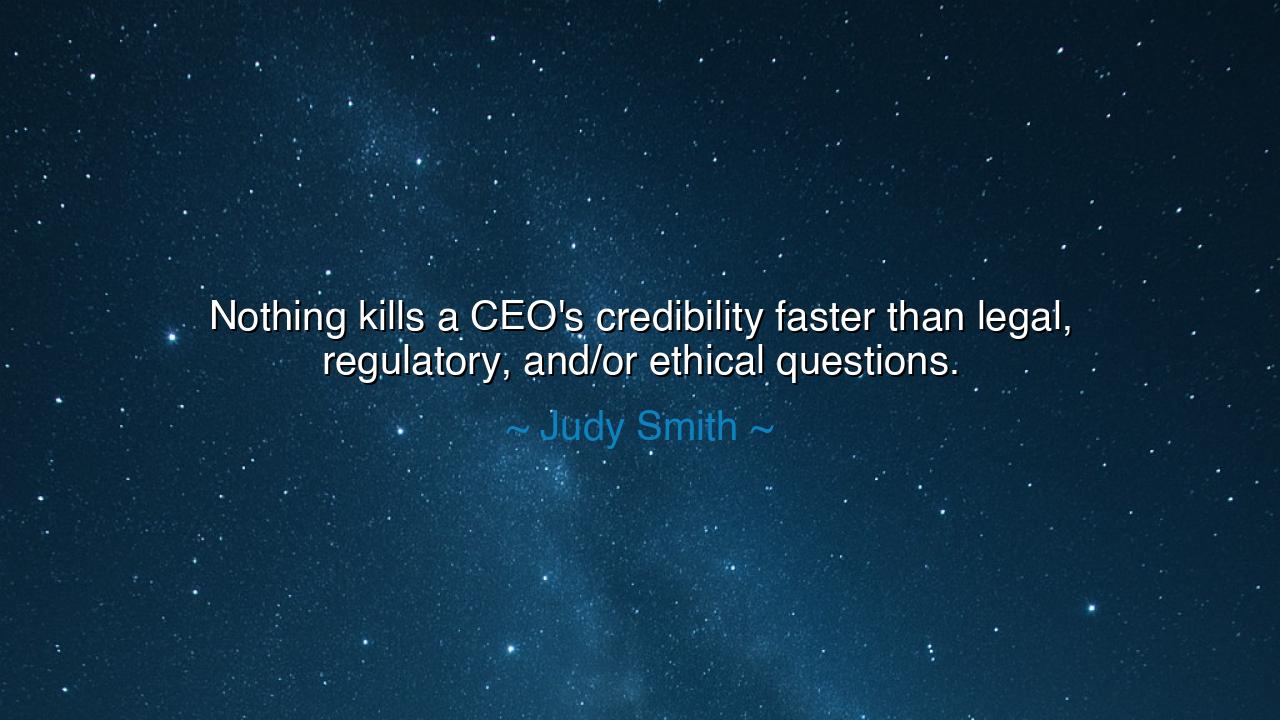
Nothing kills a CEO's credibility faster than legal, regulatory
Nothing kills a CEO's credibility faster than legal, regulatory, and/or ethical questions.






The words of Judy Smith strike like a chisel upon the marble of leadership: “Nothing kills a CEO’s credibility faster than legal, regulatory, and/or ethical questions.” In this single sentence lies the distilled wisdom of centuries — that power without integrity is hollow, and that the fall of great leaders begins not with external attack, but with the quiet erosion of moral authority. A leader’s credibility is like light — hard-won, luminous, and fragile. Once shadowed by questions of law or conscience, it flickers and fades. For the foundation of all leadership is trust, and trust, once broken, is not easily rebuilt.
The origin of this quote comes from Smith’s deep experience as a crisis manager — a woman whose career has been built upon restoring order amid chaos. She has seen empires of reputation crumble overnight when the pillars of ethics and legality were neglected. Her insight, however, transcends the world of business. It speaks to a universal law: that credibility, like honor, cannot coexist with deceit. When a leader violates the sacred bond of trust — whether through corruption, arrogance, or moral blindness — their words lose weight, their vision loses clarity, and even their successes turn to dust.
The ancients knew this truth well. In the days of the Roman Republic, the name Cicero was once synonymous with virtue and eloquence. But when others in the Senate — men like Catiline — sought power through deceit and conspiracy, Cicero warned the people that moral rot is the first symptom of collapse. His words, though two thousand years old, echo the same principle that Judy Smith invokes today: that the fate of a leader is tied not merely to their decisions, but to their character. The downfall of kings, emperors, and executives alike begins not with failure of strategy, but failure of soul.
Modern history offers its own proof. Consider the story of Richard Nixon, a man of brilliance and political mastery, undone not by war or economy but by ethical transgression — the deception of Watergate. When the truth emerged, it was not the crime alone that condemned him, but the betrayal of trust. Once the people saw that their leader had placed ambition above integrity, his authority dissolved. He resigned not because he lost power, but because he lost credibility, and with it, the moral right to lead. In that moment, Smith’s wisdom was made manifest: when legal and ethical questions arise, no fortress of influence can withstand the storm of lost trust.
In the world of business, the same law reigns. Enron, once a titan of American industry, fell in flames because its leaders built an empire on illusion. Numbers were falsified, profits fabricated, and principles forgotten. When truth pierced the veil, billions vanished, reputations perished, and the very concept of corporate trust was shaken. It was not incompetence that destroyed them, but corruption — the quiet rot that eats through the heart of success. So too must every modern leader remember that power and wealth are fleeting, but honor endures — and once honor is lost, no achievement can replace it.
Yet Smith’s words also carry a message of hope, for they remind us that integrity is not merely a burden — it is a shield. The leader who holds fast to principle, who faces legal and ethical challenges with transparency and humility, becomes unassailable in spirit. The winds of accusation may blow, but they cannot uproot truth. When a leader stands in righteousness, credibility is not a gift from others — it is a fortress built from within.
So let this be the lesson passed down like sacred counsel: guard your credibility as you would your life. For wealth fades, titles vanish, and empires crumble, but trust — once earned and protected — becomes immortal. Let your actions be clear as sunlight, your motives pure as water. If the law tests you, abide by it. If ethics demand sacrifice, embrace it. For there is no greater power than moral strength, and no swifter downfall than moral decay.
And thus, as Judy Smith teaches, let every leader, whether of nations or small enterprises, remember this truth: success built without integrity is but a tower of sand. It may gleam for a season, but when the tides of scrutiny rise, it will fall. Build instead upon the rock of credibility, upon the enduring stone of honesty, for only there can leadership stand eternal — admired in its time, and remembered for generations.






AAdministratorAdministrator
Welcome, honored guests. Please leave a comment, we will respond soon